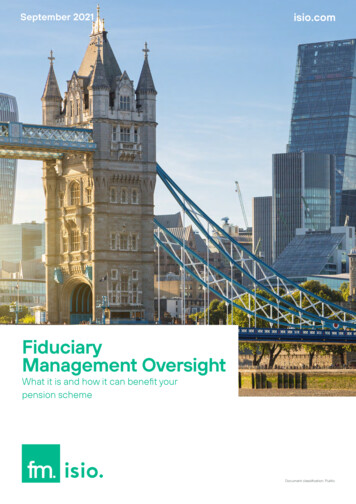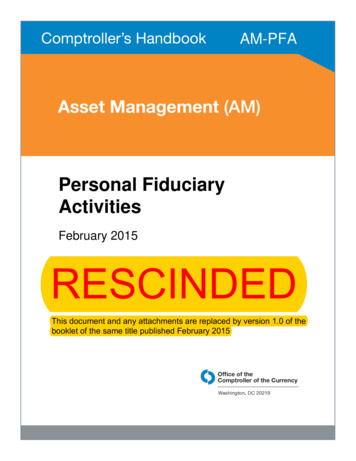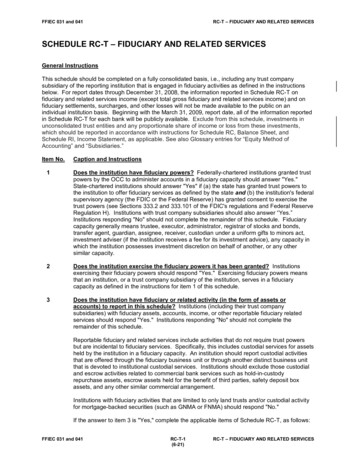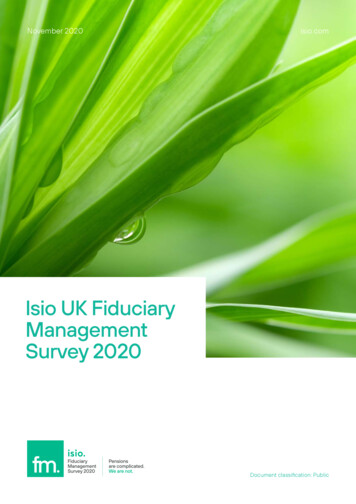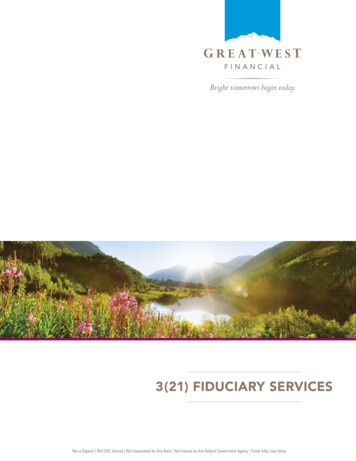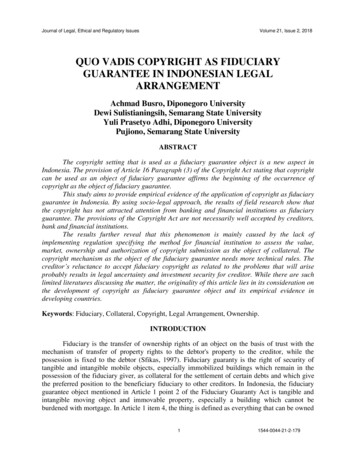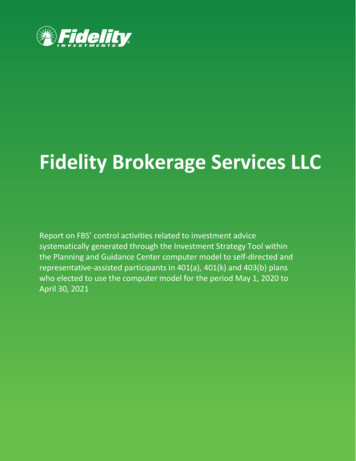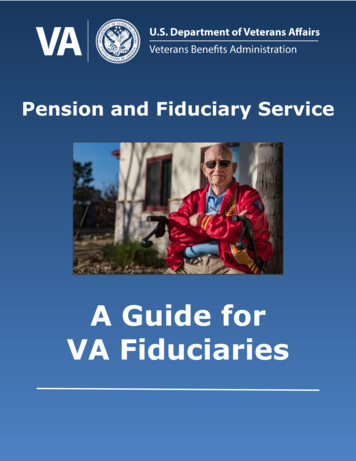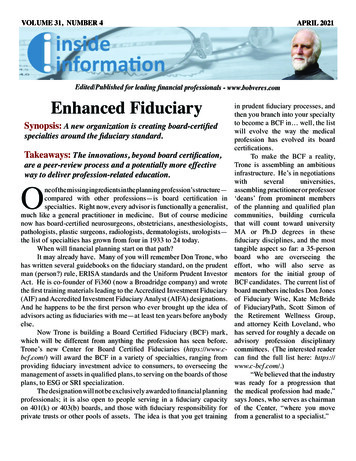
Transcription
VOLUME 31, NUMBER 4APRIL2021PageEdited/Published for leading financial professionals - www.bobveres.comEnhanced FiduciarySynopsis: A new organization is creating board-certifiedspecialties around the fiduciary standard.Takeaways: The innovations, beyond board certification,are a peer-review process and a potentially more effectiveway to deliver profession-related education.One of the missing ingredients in the planning profession’s structure—compared with other professions—is board certification inspecialties. Right now, every advisor is functionally a generalist,much like a general practitioner in medicine. But of course medicinenow has board-certified neurosurgeons, obstetricians, anesthesiologists,pathologists, plastic surgeons, radiologists, dermatologists, urologists—the list of specialties has grown from four in 1933 to 24 today.When will financial planning start on that path?It may already have. Many of you will remember Don Trone, whohas written several guidebooks on the fiduciary standard, on the prudentman (person?) rule, ERISA standards and the Uniform Prudent InvestorAct. He is co-founder of Fi360 (now a Broadridge company) and wrotethe first training materials leading to the Accredited Investment Fiduciary(AIF) and Accredited Investment Fiduciary Analyst (AIFA) designations.And he happens to be the first person who ever brought up the idea ofadvisors acting as fiduciaries with me—at least ten years before anybodyelse.Now Trone is building a Board Certified Fiduciary (BCF) mark,which will be different from anything the profession has seen before.Trone’s new Center for Board Certified Fiduciaries (https://www.cbcf.com/) will award the BCF in a variety of specialties, ranging fromproviding fiduciary investment advice to consumers, to overseeing themanagement of assets in qualified plans, to serving on the boards of thoseplans, to ESG or SRI specialization.The designation will not be exclusively awarded to financial planningprofessionals; it is also open to people serving in a fiduciary capacityon 401(k) or 403(b) boards, and those with fiduciary responsibility forprivate trusts or other pools of assets. The idea is that you get trainingApril 2021in prudent fiduciary processes, andthen you branch into your specialtyto become a BCF in well, the listwill evolve the way the medicalprofession has evolved its boardcertifications.To make the BCF a reality,Trone is assembling an ambitiousinfrastructure. He’s in negotiationswithseveraluniversities,assembling practitioner or professor‘deans’ from prominent membersof the planning and qualified plancommunities, building curriculathat will count toward universityMA or Ph.D degrees in thesefiduciary disciplines, and the mosttangible aspect so far: a 35-personboard who are overseeing theeffort, who will also serve asmentors for the initial group ofBCF candidates. The current list ofboard members includes Don Jonesof Fiduciary Wise, Kate McBrideof FiduciaryPath, Scott Simon ofthe Retirement Wellness Group,and attorney Keith Loveland, whohas served for roughly a decade onadvisory profession disciplinarycommittees. (The interested readercan find the full list here: https://www.c-bcf.com/.)“We believed that the industrywas ready for a progression thatthe medical profession had made,”says Jones, who serves as chairmanof the Center, “where you movefrom a generalist to a specialist.”Inside Information
Page 2“This is not intended forpeople in the earliest years oftheir career,” Trone adds. “Thisisn’t boot camp on fiduciarygovernance. I consider the AIFto be your freshman/sophomorecoursework, your basic course infiduciary responsibility, fiduciary101,” he says. “The AIFA is thenext level above that, your junior/senior 300-400 level courses. Weare developing the BCF to begraduate work. If we come acrosscandidates who have never donebasic fiduciary training, we mightsend them to Fi360.”But wait (I can hear achorus in the background); whatkind of training does somebodyneed to put the client’s interestsfirst? Trone, almost alone in ourprofession, has long argued thatsimply deciding not to feather yourown nest at the expense of clientsis not all there is to fiduciary; that,in fact, acting as a fiduciary—whether it be for individual clientsor pension assets—requires thecreation and maintenance ofa process-driven approach tovarious key tasks. There should beprotocols and checklists to ensurethat the underlying managers areproperly vetted and monitored, thatcosts have been negotiated to thelowest possible point, that there isclear communication between thefiduciary and client/qualified planboard about a variety of things thatare being constantly monitored.In fact, much of the BCFtraining would probably be bettercharacterized as building leadershipskills, where the fiduciary definesand executes the best path forwardfor the client, board or trust, theInside InformationDon Trone: Graduatefiduciary training, neurofiduciary evaluation andboard certification.same way a militarycommandermightcreate a battle planthat offers the greatestchance of success, andthen delegates, leads,monitors and executes.Neuro-fiduciaryHow does thetraining process work? Candidateswill enter the program through adual assessment protocol, whichstarts when they take a customizedpsychometric instrument adaptedfrom neuro-leadership researchby Dr. Sean Hannah, a retiredU.S. Army Colonel who heads theInstitute for Management Studiesat the Wake Forest UniversitySchool of Business. Trone callsthis customized version a ‘Neurofiduciary’ assessment.Candidates are asked to selfassess in a variety of areas, givingthemselves a score from “1” (weak)to “5” (proficient). The topic areasare functionally grouped under‘leadership,’ ‘stewardship’ and‘governance.’If the candidates do nothingmore than take this test, they willcome away with a surprisinglycomprehensiveeducationinthe behavioral qualities that anambitious fiduciary should aspireto. Each of the three assessmentareas includes five sub-categoriesthat are key to applying the skill,and those subcategories eachhave five components.Oneof the five subcomponents ofleadership invites candidates torate themselves on their ‘courage,’and the courage-related questionsask the candidate to self-define his/her ability or willingness to 1) takea stand on issues when needed; 2)remain resilient whenever setbacksare encountered; 3) maintainApril 2021
Page 3composure when faced withadversity; 4) overcome unfavorablesituations; and 5) take actionto achieve goals and objectivesdespite their fears and risks.The governance part ofthe assessment is broken downinto five areas which measurewhether a candidate is processdriven in making decisions: hasthe ability to analyze, strategize,formalize, implement and monitorthe processes of decision-making.Picking one of these subcategoriesat random, the ‘formalize’ part ofthe assessment asks whether thecandidate 1) employs a distinctprocess to determine the mostappropriate strategy to accomplishstated goals and objectives; 2)adapts the strategy to account forthe specific risks, assets and timehorizon of the client or plan; 3) putsthe strategy in writing; 4) reviewsthe written strategy with decisionInside Information is published monthlyby Robert N. Veres. 2021, Robert N. Veres. All rights arereserved.Please note: InsideInformation is a copyrightedinformation service that maynot be forwarded to non-subscribers except with permission from the publisher.Editorial offices:1804 Garnet AvenueSuite 510San Diego, CA 92109.E-Mail: bob@bobveres.comApril 2021makers; and 5) determines thateverybody involved has the time,inclination and knowledge toimplement the strategy.Of course, there may becandidates who simply enter a ‘5’for everything, thereby claiming topossess god-like fiduciary acumen.The Center is creating a check-andbalance, with a not-yet-finalizedpeer-review process—and peerassessment and recommend acustomized self-study course inthe areas where the candidatehappens to be weakest.TheCenter has spent the past two yearscompiling a virtual mountain ofresearch papers, blogs, quotes,checklists and templates, TED talkvideos and other resources that acandidate can review in specificsubject areas.The assessmentTrone envisions a 360-degree neuro-fiduciaryevaluation involving three each of acandidate's peers, clients andstaff members.review, of course, is another itemon the planning profession’saspirational list.“We actually plan to go tothree levels [with the assessment],’says Trone, “with three peopleat each of those levels: threeprofessional peers, three staffmembers and three clients, whowould all complete the instrumentabout the advisor. Do I, as a client,feel that my advisor is courageous?Do I feel that my advisor iscollaborative? Do I feel that myadvisor is attentive? The wholeprocess,” Trone adds, is designedto acknowledge the strengths andidentify the shortfalls, and howthose shortfalls are impacting thequality of the candidate’s fiduciarydecision-making.”Once the initial assessmentprocess has been completed, eachcandidate is assigned a mentor—initially, as mentioned earlier,this will be one of the 35 boardmembers—who will review theinstrument itself provides thenavigation: in each topic area, thecandidate’s report includes links tothe “augmented learning landingpages” on Trone’s 3Ethos.com webenvironment.Each candidates’progress is monitored and guidedby the mentor.Trone argues that this initialself-study process is superior tothe traditional CE-credit approachtaken by our profession’s existingdesignations. “The neurosciencebehind neuro-learning asks someimportant questions,” he says:“How can weimprove adultlearning? How do we improveretention and how do we acceleratelearning?Traditionally,” hepoints out, “there is the hour-longPowerpoint presentation, with acontinuing education quiz at theend. But it has been demonstratedthat six months later, you will haveforgotten 90% of that content.”Monitored self-study focusingon areas of weakness, where theInside Information
Page 4mentor provides accountability,accomplishes two things: itreplaces generic information thatmight not be relevant with highlyrelevant, customized content; andit replaces a one-time assessmentimmediately after the content ispresented with an accountability toabsorb and retain this informationlong-term.unique MA designations, with aspecified number of graduate hoursin fiduciary responsibility, whichmay also be stackable towards anMBA. “This will not all be virtual,”Trone cautions. “The universitieswill require a certain percentageof the coursework be done at thatuniversity, but we are arranging forthem to accept coursework fromThe Center is abandoning the CE credit approachfor focused self-study ina candidate's weaknesses, with a mentorholding him/her accountable for ongoing learning.University degreesToachievetheBCFdesignation in an area of speciality,the candidates will also go througha more formal curriculum infiduciary leadership, stewardshipand governance, developed inpartnership with the universitysystem. This is still a work-inprogress. Trone is in negotiationswith one primary university tobecome the hub, around whichmany other universities will offercurricula in specialized areas.“There are eight that we’re talkingto,” he says. “We expect that in sixmonths to a year, we will identifythe university that is going to beour academic home, and we arefinding that all of the universitieswe’ve talked with want to be apartner in this.”This will be a combinationof remote learning and on-campusclasses, with the initial goal tocreate a masters-level curricula andInside Informationother universities as well.”These courses will not, atleast initially, be coordinated withthe university’s financial planningprogram; Trone repeats that theBCF specialty designations is notfor somebody with zero real-worldexperience. In his conversationswith the deans of business schools,it is not uncommon for the dean todiscover that there is a financialplanningcurriculumwhichwould seem to be a part of theconversation. “We’re explainingto the dean that the people whoare CFP candidates,” says Trone,“not the day they finish the CFPprogram, but 10 or 15 years later,may be ready to come back for thetype of work we’re talking about.”Initial qualificationsTrone was the central figurein building the Fi360 educationalprograms and designations, sobuilding curricula, and devisingmoreeffectiveeducationalpractices, are areas where heshould be taken seriously. Butwhat about the foundationalaspects of the program? Are thereminimum credentials you have toachieve before you knock on theCenter’s door. Does the candidatehave to have the CFP or AIF to beconsidered initially?The answer is yes and no, fora variety of reasons. In responseto the CFP/AIF question, Tronepoints out that the BCF is notexclusively available to financialplanners, and that we sometimesforget that the fiduciary standard isdirectly applicable to a much widergroup of individuals than our smallprofession.“This opportunityis also going to be open to eightmillion lay fiduciaries,” he says,“including trustees and investmentcommittee members of foundations,endowments and personal trusts. IfI was doing a virtual workshop rightnow,” he adds, “I could have fouradvisors and fifty lay fiduciaries,but the content, and the deliveryof the content, would be the same.We don’t want to create a barrierthat keeps the lay fiduciary out.”As alluded to before,candidates will definitely need tomeet an experience requirement,but that will be part of thecustomized evaluation: the selfassessment, the 360-degree peerreview, and the mentor evaluatingwhether the candidate has theexperience needed to take the nextstep to achieve certified fiduciaryspecialist status. There is not, inother words, a requirement thatthe BCF candidate have workedfor some rigid number of years—and there is a concrete reason forApril 2021
Page 5that ambiguity as well. “In ourconversations with the universities,the deans specifically stated thatthey do not want to create artificialbarriers to the entry into theirprogram,” says Trone. “If we setthe work experience at ten years,”he adds, “then we would have tocome back to the university andexplain why the candidate is notqualified in year nine. And doesthat mean that the candidate isnecessarily more qualified in year11?”that? Or did you prepare your owndocument from scratch?I used a template.When was the last time youupdated that template? When wasthe last time you opened up thetemplate and understood all theGaining the credentialdocumentation and the wording init?“You keep peeling away thelayers until the three subject matterexperts feel that the candidatedeeply understands the topics,”says Trone, “and they will move onfrom each topic or decide that thisperson doesn’t fully understandit. At the end of two hours,” headds, “we huddle together and say,okay, does this candidate, in fact,demonstrate an understanding ofthis specialization? Or does thiscandidate need more work?”The Center won’t award itscredential based on whether ornot a candidate passes a writtentest. The process will be more likethe oral exams that universitieshave instituted for their master’sand Ph.D. candidates.“Verysimilar to a Ph.D dissertation,there will be three subject matterexperts who will be on a call fortwo hours with a candidate,” saysTrone. “One of the experts will betesting the candidate’s leadershipand stewardship concepts. Thesecond subject matter expertwill be testing the candidate’sunderstandingoffiduciaryprocesses and best practicesassociated with those processes.The third will be an expert fromthe area of specialization chosenby the candidate.”As Trone envisions theprocess, the questioning might gosomething like this:Didyouprepareaninvestment strategy for the client?Yes.Did you use a template to doApril 2021a mentor,” Trone explains. “Ifyou’re a BCF, and we notice thatyou have skills we have not seenelsewhere, we may reach back andsay we would like you to becomeone of the speciality leaders. Ifyou have an area of specialization,Instead of a passing a written test,BCF candidates willearn the designation bypassing an oral exam.Ongoing requirementsInstead of CE requirements,people who achieve the BCFdesignation—and any associateddegrees conferred through theuniversity system—will haveto meet more practical ongoingobligations.“We are notidentifying arbitrary continuingeducation hours to maintain thecertification,” says Trone. “Instead,the requirement is that you have togive work back to the profession.A BCF may be called upon to bewe might ask you to start a newarea of specialization for the BCF.”There will be a ‘publish orperish’ requirement not unlikehow university professors achievetenure.“You are expected topublish,” Trone says, “but itdoesn’t necessarily need to be a60-page research paper. It could bea slide where you develop contentthat will be useful to others.”Jones says that the finalongoing requirement is simplyto grow in fiduciary awarenessand understanding of a specificaspect of advice. “As we talkedabout this organization,” he says,“we started wondering why therecouldn’t be an organization wherethe continuing education would bebased on the doing, not the abilityto pass a test,” he says.EnforcementLoveland, a veteran securitiesattorney who founded the Centerfor Fiduciary Studies, and nowserves as the Center’s GeneralCouncil, says that he’s overseeingthe development of a code ofInside Information
Page 6conduct, a complaint procedureand a disciplinary process. “Peoplewill be required to uphold highstandards, and every complaint willbe handled through that process,”he says, “with decisions that couldinclude revocation of the mark, andhe says, have all benefited fromthe initial assessment and reviewprocess, and from diving intothe materials to shore up theirweaknesses.“All of us havemade a mark in the world,” saysJones. “Speaking for myself, IA BCF could be called on to serveas a mentor, or a specialty leader,or to start a new specialization.And they'll publish or perish.appeals to the Board of Directors.”The ongoing peer reviewprocess will also monitor whetherthe BCF credential holders arecontinuing to progress in theircareers and understanding of theirspecialties. Jones says that the kindof candidates they’re looking forwill not view this as a requirement,but as a welcome enhancement totheir careers.The 35 board members,was comfortable in my world andwhat I was doing. Then I becamea part of what we’re doing here,and suddenly I’m learning everyday,” he adds. “In eight months,I have become a better person. Iam a better professional, and it isstretching me in ways that I neverexpected.”TheCenter’sboardcertification process is not exclusiveto the profession, but it is pioneeringa way for the planning world tomove closer to the diversity andspecialized expertise that we find inother professions. The peer reviewprocess also breaks interesting newground and introduces anotheraspect of “true” professions. Butperhaps the most interesting part ofthe BCF approach to credentialingis the emphasis on doing ratherthan passing a test and attendingCE classes. Instead of grantinga credential for life, or offeringa membership in an association,this BCF initiative seems to fostercontinual growth from an advancedlevel to something more advanced.“We’re less concerned aboutyour credential than we are theliving of what you’re doing,” saysTrone. “When somebody gets amark as a board-certified fiduciary,at the end of the day, the mark isjust another mark to put at the endof your name. It is the doing andliving of it that matters.”Reprinted with permission from Inside Information - http://www.bobveres.comInside InformationApril 2021
ambitious fiduciary should aspire to. Each of the three assessment Don Trone: Graduate fiduciary training, neuro-fiduciary evaluation and board certification. same way a military commander might create a battle plan that offers the greatest chance of success, and then delegates, leads, monitors and executes. Neuro-fiduciary How does the
